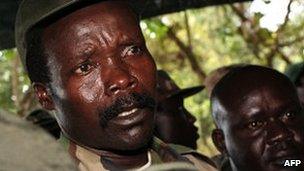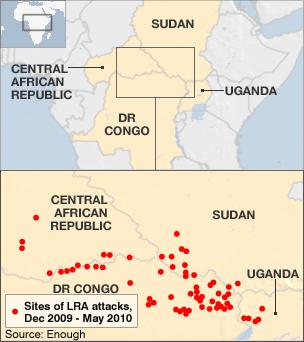Barack Obama's plan to defeat Ugandan LRA rebels
- Published

Mr Kony is wanted by the International Criminal Court for crimes against humanity
US President Barack Obama has outlined a plan to disarm one of Africa's most feared rebel militias, the Ugandan Lord's Resistance Army.
It aims to defuse the spiralling bloodshed in central Africa by removing the LRA's leader, Joseph Kony.
LRA fighters will also be encouraged to defect or lay down their arms.
US ally Uganda has for more than 20 years failed to defeat the LRA, notorious for kidnapping children to serve as soldiers and sex slaves.
LRA leaders initially claimed to be fighting to install a theocracy in Uganda based on the Biblical 10 commandments.
But they now roam across parts of Sudan and Central African Republic (CAR), as well as north-eastern Democratic Republic of Congo.
The US has given logistical and intelligence support in the past to the armies of Uganda, Southern Sudan and DR Congo.
But their concerted push in December 2008 to kill LRA commanders failed - the group dispersed and attacked churches and villages in DR Congo that year.
Evading peace
President Obama presented his four-point strategy for disarming the rebels to the US Congress in a letter , externalto senators and representatives.
He was responding to US legislation passed in May promising a comprehensive strategy to put a stop to the LRA's killing, raping and mutilations.
Mr Obama's letter said that strategy would:
Aim to protect civilians
Apprehend or remove from the battlefield Mr Kony and his commanders
Promote the defection or disarmament of LRA fighters
Increase humanitarian assistance to people in LRA-affected areas.
He also said it would provide a framework for the co-ordination of US efforts.
"Given the necessity of bringing political, economic, military, and intelligence support to bear in addressing the threat posed by the LRA," Mr Obama said in his letter, "the development of the strategy relied on the significant involvement of the Department of State, the Department of Defense, the US Agency for International Development, and the intelligence community. All will remain engaged throughout implementation."
Mr Kony is wanted by the International Criminal Court (ICC), and now lives an itinerant life, mainly crossing between Sudan and the CAR.
Efforts to find peace over the years have not yielded fruit.
In 2008, the LRA leader was about to sign a peace deal with Uganda, negotiated by Southern Sudan, but at the last minute he refused to lay down his arms.
'No boots on the ground'
Witney Schneidman, a former US deputy assistant secretary of state for African affairs, said Mr Obama's plan was a significant development.

"The administration is saying it is prepared to be a partner to the government of Uganda and the government of DR Congo in eliminating the instability," he told the BBC's Network Africa.
"The elimination of Kony is a military strategic issue - highly complex and one that needs to be undertaken with very careful thought and planning.
"You're not going to see US boots on the ground but I think you're going to see the US being a partner in many other ways."
Michael Poffenberger, executive director of Resolve - a US-based campaign group that has been pressing for a new strategy to end the LRA's reign of fear - says defeating the group will be difficult.
"They purposely target communities in remote and marginalised areas where they're most likely not to generate a response from the rest of the world and that strategy has largely succeeded," he says.
Implementing the White House strategy will depend on funding but there are certain aspects of the plan that can go ahead without difficulty, he says.
"Building telecommunications infrastructure - cellphone and radio capacity - so that communities being targeted have a way of getting information out to the outside world.
"[And] improving the capacity of militaries in the region to co-ordinate amongst each and provide them with mobility support."
Last month, Uganda, CAR, Sudan and DR Congo agreed to form a joint military force to fight the militia.